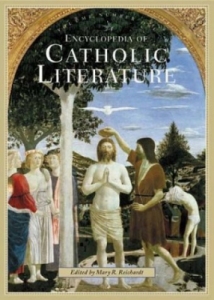
|
Posted October 27, 2004
Book: Encyclopedia of Catholic Literature: Volume Number One Edited by Mary R. Reichardt Greenwood Press, Westport, CT, pp. 400 An Excerpt from the Jacket:
Included are substantial entries on more than 70 major works from around the world. A special effort has been made to cover women writers and writers of diverse racial and ethnic backgrounds, whose works reflect the many dimensions of the Catholic experience. The encyclopedia provides entries on such writers and works as St. Augustine’s Confessions, Catherine of Siena’s Dialogue, Dante’s The Divine Comedy, Sandra Cisneros’ The House on Mango Street, J.R.R. Tolkien’s The Lord of the Rings, and Muriel Spark’s Memento Mori. Each entry is written by an expert contributor and includes a biography of the writer, a plot summary of a major work, an extended critical discussion, an overview of the work’s critical reception, and a selected bibliography. The entries give detailed attention to particular works and explore their relation to Catholic thought. The encyclopedia concludes with a selected, general bibliography. An Excerpt from the Book: Desiderius Erasmus The Praise of Folly is compact but richly textured and stylistically complex. It is a paradoxical encomium, a declamation in which Folly, personified as a woman, extols her influence over the human race. Although the work itself contains no formal divisions, the speech Folly delivers is usually regarded as following a loosely structure three-part argument that most, if not all, men and women are fools — that folly, in fact, undergirds the whole human condition. In the first part, Folly shows that, without her, men and women would suffer such despair that life would scarcely be possible; in the second part she offers numerous examples of how she enables secular and ecclesiastical leaders in particular to ignore their own sins so as to misdirect the affairs of eveyone else; and finally, in the last part of the speech, she declares that she even enables the practice of Christian faith and is responsible for the attainment of the beatific vision. The work ends with Folly’s claim that she cannot provide the epilogue that is customary when concluding a public declamation because she has forgotten everything she said. . . . The Praise of Folly thus draws together a number of themes important to Erasmus’s thought. Erasmus’s vision for a Christlike society depended on both an accurate understanding of the Scriptures and a thorough cleansing of those offices and institutions that had, in his view, fallen away from Christian ideals. In its satiric mode, The Praise of Folly attempts that purgative function. At the same time, as Clarence H. Miller, the work’s most important modern translator and editor, asserts in his introduction to the Yale edition of the work, “no other brief, integral work of Erasmus condenses the humanists’ program for educational, religious, and theological reform better than the Folly.” Without denying the deep, at times even bitter, criticism of the Church that pervades The Praise of Folly . . . was more authentic Christianity than was sometimes exhibited by the established Church of his time. Among authors in Table of Contents: Peter Abelard, Hilaire Belloc, Orestes Brownson, G.K. Chesterton, Elizabeth Cullinan. Dorothy Day, John Dryden, Andre Dubus, J.F. Powers, Edith Stein, Evelyn Waugh, Thomas Merton, Flannery O’Connor, James Joyce, Graham Greene, Walker Percy. |
|
